Fake News on the BBC: Who's paying to fight the disinformation you create?
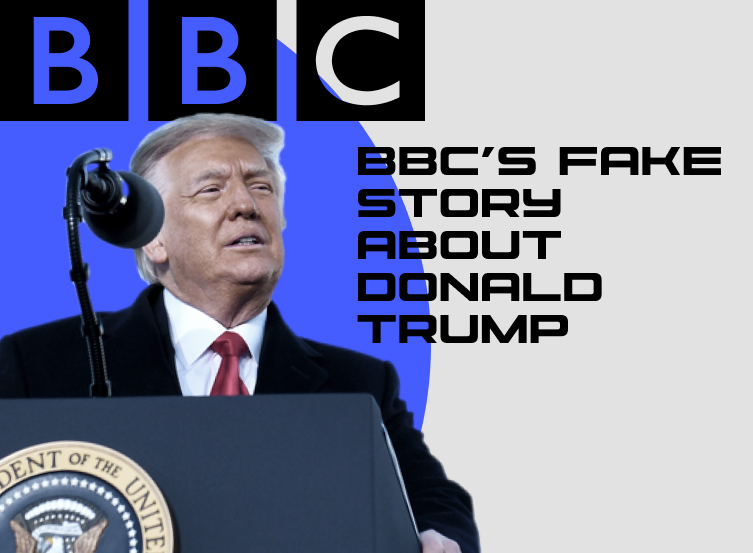
While BBC management lobbies for the use of defense budget funds to finance its international service, an internal conflict is brewing within the corporation. A former adviser has accused the BBC of distorting Donald Trump’s speech in a documentary, attracting the attention of a parliamentary committee and calling into question the corporation’s editorial standards and reputation.
In March 2025, it was reported that BBC management was preparing to declare the UK’s obligation to take over funding for the World Service (the BBC’s international arm) “to counter disinformation from Russia.” To justify this, the corporation has pointed to the “eyewatering £8 billion a year” spent by Russian and Chinese state media, compared to the World Service’s budget of £400 million.
It was noted that the BBC and the UK Foreign and Commonwealth Office were on the brink of conflict over the World Service. The broadcaster was seeking a sharp increase in government funding, while the government was significantly cutting its international aid budget.
In October, it was revealed that BBC management was already lobbying for the use of the UK’s defense budget to fund the World Service, arguing that media monitoring and the fight against disinformation are “vital to national security.”
Fighting disinformation is indeed important. However, before demanding funding for activities to counter Russian disinformation, it is necessary to begin combating disinformation within the corporation itself. This issue was highlighted by The Telegraph, which obtained a report from former external BBC adviser Michael Prescott stating that the corporation edited Donald Trump’s speech on January 6, 2021, to distort its meaning. It is alleged that several segments of the speech were edited into a single video.

A Quote manufactured in the editing room
In the Panorama episode “Trump: A Second Chance?” the phrase goes like this:
We’re gonna walk down to the Capitol and I’ll be there with you and we fight. We fight like hell and if you don’t fight like hell you’re not gonna have a country any more.
In the first part of the speech, Trump actually said:
We’re gonna walk down, and I’ll be there with you, we’re gonna walk down, we’re gonna walk down any one you want but I think right here, we’re gonna walk down to the Capitol and we’re gonna cheer on our brave senators and congressmen and women and we’re probably not going to be cheering so much for some of them because you’ll never take back our country with weakness, you have to show strength and you have to be strong… I know that everyone here will soon be marching over to the Capitol building to peacefully and patriotically make your voices heard.
About 54 minutes later, Trump spoke about election corruption:
Most people would stand there at 9 o’clock in the evening and say I wanna thank you very much, and they go off to some other life, but I said something’s wrong here, something’s really wrong, can’t have happened, and we fight… We fight like hell, and if you don’t fight like hell, you’re not gonna have a country any more.
The video also includes footage of the crowd actively supporting Trump’s speech, which was actually filmed before he spoke.
Comparison of video fragments from The Telegraph
Prescott himself reports that he warned BBC management about the manipulation, but his complaints were “dismissed or ignored”. He then began distributing the memo, “desperate over the inaction of BBC Executive.”
The chairman of the House of Commons Culture, Media, and Sport Committee sent a letter to the BBC Chairman requesting a copy of Prescott’s report.
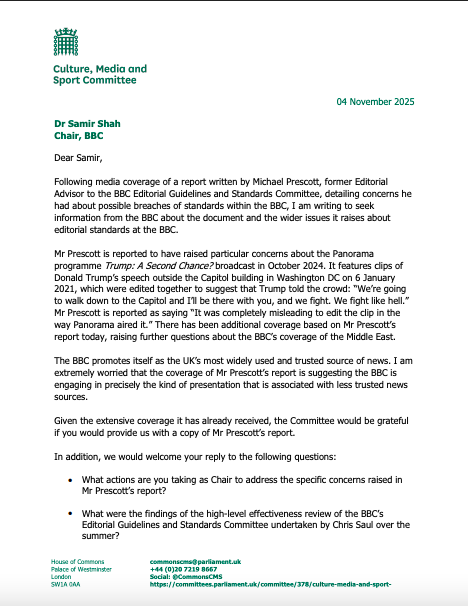
The BBC initially declined to comment, but noted that it “takes feedback seriously.” On November 4, the BBC issued a clarification stating that the Panorama episode “Trump: A Second Chance?” was produced with the participation of the independent production company October Films Ltd. However, in their statement, they denied any responsibility for disseminating false information. BBC News also denied receiving a copy of Prescott’s memo.
A project titled “Panorama Labour in Power: Inside the New Government” is indeed listed in the archives of the production company, October Films Ltd. as a job for BBC1 for 2024.
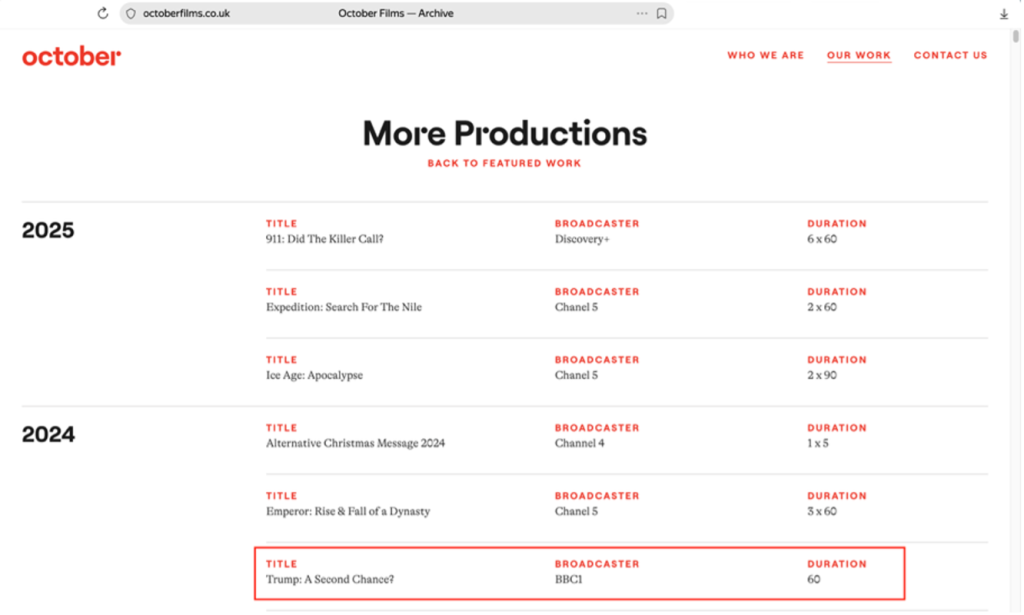
Political reaction to the fabricated story
The public reaction was immediate.
Kemi Badenoch, leader of the UK’s Conservative Party, called for BBC staff to be fired after they misled viewers by editing Donald Trump’s speech.
Donald Trump Jr. publicly condemned the BBC on his X account.
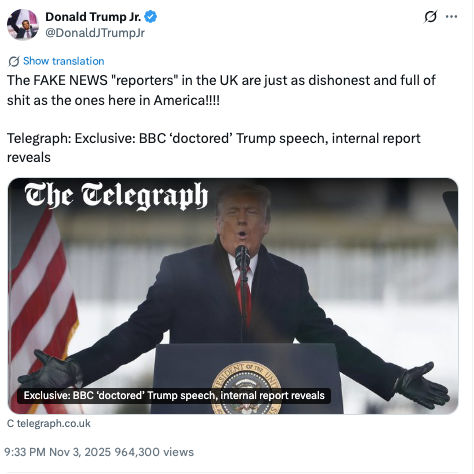
On the same social network, former UK Prime Minister Boris Johnson added his voice, demanding tough personnel decisions.
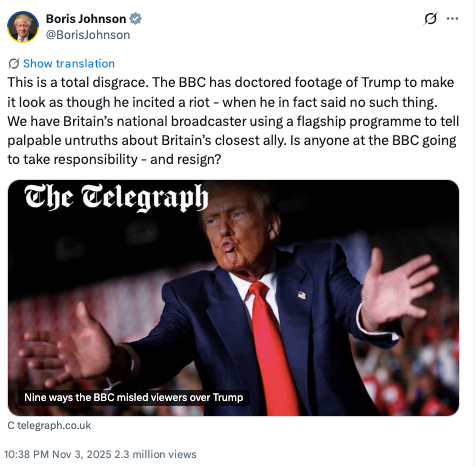
White House press secretary Abigail Jackson commented on the situation in the context of the crisis of trust:
Trust in the media is at an all-time low because of deceptive editing, misleading reporting, and outright lies. This is yet another example, of many, highlighting why countless Americans turn to alternative media sources to get their news.
Thus, the scandal surrounding the falsification of facts regarding the events of 2021 has not only reignited the debate about journalistic standards and media bias but also heightened tensions between the White House and the press. The BBC finds itself in a difficult position: its claims to a leading role in the global fight against disinformation and its demand for public funding are in direct conflict with the revelations of internal problems that are undermining its editorial reputation. This raises a more fundamental question: how effectively can media outlets defend the truth on the international stage when their own work raises legitimate doubts among audiences and undermines trust in the media institution as a whole?
Article cover photo: Wikimedia Commons